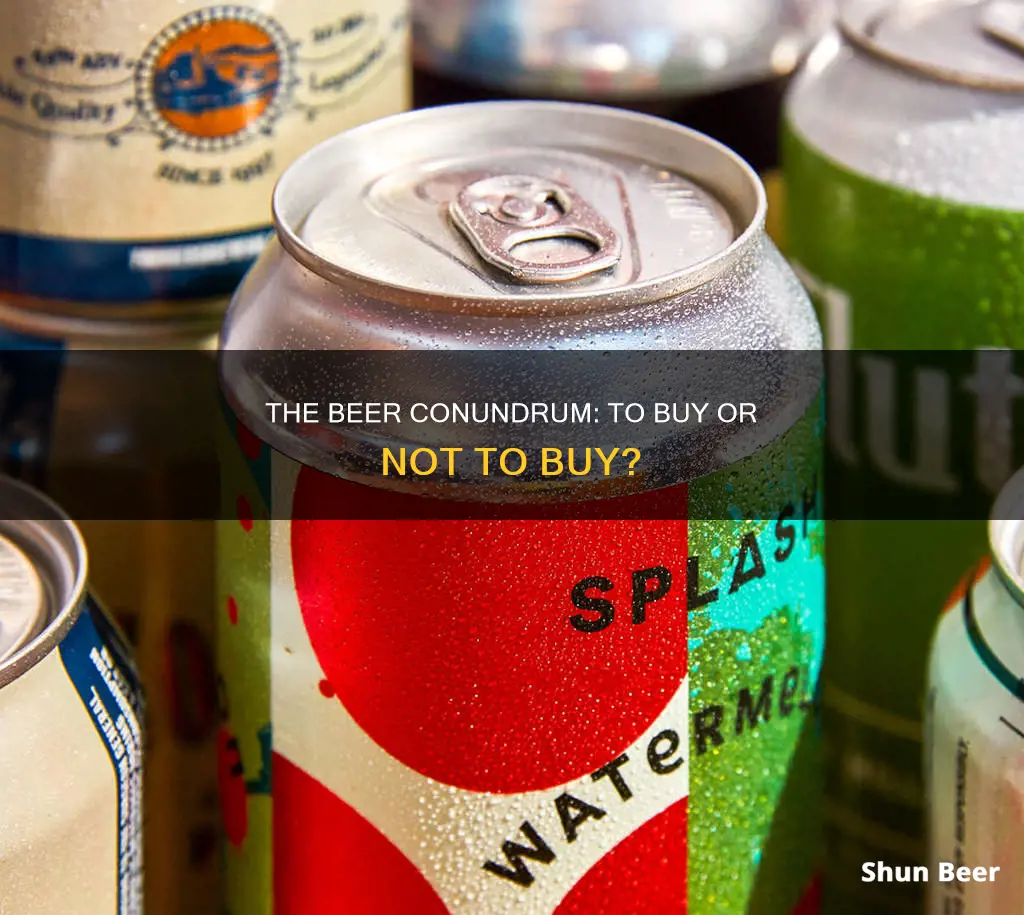
Whether you're stocking up for a party or just fancy a cold one after a long day, buying beer can be a tricky business. It's not as simple as grabbing the first six-pack you see – unless you want to end up with a \weirdo\ raspberry peanut butter porter, that is. There's a lot to consider, from freshness and flavour to the type of beer and where you buy it. So, before you head out to the store, here's everything you need to know about buying beer.
| Characteristics | Values |
|---|---|
| Beer Expiry | Beer does expire, but it is not unsafe to drink past the expiry date. |
| Beer Quality | Beer quality and taste degrade over time, especially in transparent bottles. |
| Beer Storage | Beer should be stored in a cool, dark place, away from temperature fluctuations. |
| Beer Purchase | It is recommended to buy beer from places with high sales volume to ensure freshness. |
| Beer Types | Some beers, like stouts and Belgian beers, improve with age, while IPAs and pale ales should be consumed fresh. |
| Beer and Health | Beer is perishable but does not spoil like milk; it is safe to drink, but the taste may be unpleasant. |
| Beer and Light | Light exposure, especially UV rays, can cause beer to develop a skunky odour and taste, so it should be stored in brown bottles or cans. |
| Beer and Temperature | Beer lasts longer when refrigerated and should not be allowed to warm up and cool down repeatedly. |
What You'll Learn

What type of beer should I buy?
When it comes to choosing a beer, freshness is key. Beer is perishable, and while it won't spoil in the same way that milk does, it will start to taste stale and lose its flavour. So, the first thing to consider when buying beer is the "bottled on" or "best by" date. As a general rule, avoid beers that are within two months of their "best by" date, and don't buy IPAs or pale ales that were bottled more than a month ago.
Another thing to consider is temperature. Beer should be stored in a cool, dark place, and this is especially important for hoppy beers like IPAs. Don't buy an IPA that has been stored at room temperature, as the hop oils that give beers their fruity, piney flavour will lose their potency in a warm climate.
Now, onto the different types of beer. Here are some popular options:
- Lager: This is a classic, easy-drinking option. Examples include Modelo Especial, Coors Light, and Miller High Life.
- IPA: India Pale Ales tend to have bold, bitter flavours and are often very hoppy. Popular choices include Cigar City Jai Alai, Bell's Two Hearted, and Dogfish Head 60 Minute IPA.
- Stout: Stouts are typically dark and smooth, with a roasted flavour. Guinness is a well-known example, while Schofferhofer Grapefruit Hefeweizen is a fruity twist on the traditional stout.
- Wheat Ale: Wheat ales tend to be subtle and spicy. Try Bell's Oberon for an American wheat ale, or Weihenstaphaner Hefe Weissbier for a German wheat beer.
- Pale Ale: Pale ales are usually hoppy and citrusy. A popular choice is Sierra Nevada Pale Ale.
- Belgian-Style Beer: These beers often have fruity and spicy notes and can be quite strong. Try Victory Golden Monkey or Chimay Grande Reserve.
So, what type of beer should you buy? Well, that depends on your personal preference! If you like your beer bold and bitter, go for an IPA. If you prefer something a little sweeter, try a wheat ale or a Belgian-style beer. For a classic, easy-drinking option, you can't go wrong with a lager. Just make sure to check the date and store your beer properly to ensure it stays fresh!
Underage Beer Buying: Sneaky Strategies for Minors
You may want to see also

How fresh is the beer?
Beer is best enjoyed as fresh as possible. While it won't make you sick, stale beer loses its bright, fresh flavours and can taste muddled and lame. The longer a beer remains undrunk, the more its flavours dull, then disappear, and are eventually replaced with off-flavours.
To ensure freshness, look for the "bottled on" or "best by" date on the bottom or side of the can or bottle. Avoid IPAs or pale ales that were bottled more than a month ago, and for the most part, avoid buying beer that’s within two months of its “best by” date.
Different beers have different shelf lives. Beers with higher alcohol content and malt-forward styles, like barley wines and imperial stouts, are brewed with the intent that they will be aged. However, for hop-heavy styles like IPAs, freshness is key as the volatile aromas from hops—which give IPAs their characteristic hoppy aroma—tend to dissipate over time.
Many breweries include date stamps on their beer, but this is not a requirement, and the format of these date stamps varies from brewery to brewery. Some breweries use "enjoy by" or "best before" dates, while others include the date the beer was brewed. If you can't find a date stamp, look for a batch number or Julian Calendar code. You can also check the brewery's website, as some breweries, like Firestone Walker and Stone, have forms for reporting expired beer.
If you're buying beer from a store, look for beer in cans, as they tend to stay fresh-tasting longer than bottles because they block out sunlight and prevent oxygenation better. If you're at a bar, head for the taps first, as the filling process in a quality kegging operation will exclude much less oxygen than canning.
Buying Beer in Stardew Valley: A Quick Guide
You may want to see also

Where is the best place to buy beer?
So, you've decided to go out and buy some beer. The next question is: where is the best place to buy it?
Firstly, you'll want to consider the type of beer you're after. If you're looking for a more specialist beer, you might want to try a local bottle shop. These smaller, independent stores often have a more knowledgeable staff base, so you can ask for advice and recommendations. They may also have a better selection of local beers, which is great if you want to try something new and unique to your area. However, the smaller size of these stores means that their stock might not be as fresh as a larger store. If you're after a more standard beer, a national brand, or a large craft brewery, you may be better off at a supermarket. The higher turnover of these larger stores means that the beer is likely to be fresher.
If you're after a hoppy beer, such as an IPA, pale ale, or dry-hopped saison, it's imperative that you buy it from the refrigerated section. Hop oils, which give beers their fruity, piney flavour, lose their potency in warm climates, so buying an IPA that has been stored at room temperature is a big no-no. If you're buying a higher alcohol, less hoppy beer, it can be stored at room temperature, but for maximum freshness, cold is always better.
When it comes to buying beer, you want to make sure it's as fresh as possible. Beer is perishable and, while it won't make you sick, it will start to taste bad after a certain amount of time. Most beers are best within the first 30 days of bottling and should be consumed within 90 days. To find out how old your beer is, look for a "bottled on" or "best by" date on the label or bottle. If there's no date, you can ask a salesperson when they received the beer, or how quickly they sell beer from that particular brewery.
If you're buying beer to drink at home, it's best to store it in the fridge until you're ready to drink it. If fridge space is an issue, keep it in the coolest, darkest part of your home.
Buying Beer in Bulk: Is It Possible?
You may want to see also

Is it better to go to a bar than buy beer?
There are several factors to consider when deciding between going to a bar and buying beer to drink at home. One key factor is the quality and freshness of the beer. Beer is generally best enjoyed fresh, preferably within the first 30 days of bottling, and should be stored in a cool, dark place. Buying beer from a store means you can check the "bottled on" or "best by" dates and store it properly to ensure freshness. On the other hand, when drinking beer at a bar, it can be tricky to determine the freshness of the beer, and you are at the mercy of the bar's storage practices.
Another factor is convenience and cost. Going to a bar requires you to travel to the location, whereas buying beer from a store allows you to enjoy your drink from the comfort of your home. Additionally, buying beer in bulk from a store can often be more cost-effective than purchasing individual drinks at a bar. However, bars offer a wider variety of beers on tap, allowing you to try different options without committing to a full pack.
Socializing is another important aspect to consider. Going to a bar provides an opportunity to socialize with friends or meet new people, creating a more vibrant and engaging drinking experience. Drinking at home may be more suitable if you prefer a quieter, more intimate setting or want to spend time with a small group of close friends.
Lastly, the overall drinking experience, including the ambiance and service, may influence your decision. Bars often offer a unique atmosphere, music, and entertainment that can enhance your drinking experience. Additionally, bartenders can provide recommendations and mix drinks to suit your taste preferences. At home, you have the flexibility to create your own drinking experience, whether it's a quiet night in or a lively gathering with friends.
In conclusion, both options have their advantages. Going to a bar can offer a wider variety of beers, a vibrant social setting, and a unique drinking experience. On the other hand, buying beer from a store allows you to ensure freshness, save costs, and enjoy your drink in the comfort and privacy of your home. Ultimately, the decision depends on your personal preferences, social inclinations, and the specific circumstances.
Buying Beer on Sundays in Winchester, VA: What's Allowed?
You may want to see also

How long will the beer last?
Beer doesn't spoil in the same way that milk does, and it is always safe to drink if the seal on the can or bottle is intact. However, the flavour of beer will degrade over time, and it is best to drink it as fresh as possible. Beer has four main enemies: light, heat, oxygen, and time.
The length of time that beer will last depends on the type of beer, the way it is stored, and whether it has been opened. Beer stored in a refrigerator will last longer than beer stored at room temperature. Beer in brown glass bottles or aluminium cans will last longer than beer in clear or green glass bottles, as brown glass and aluminium block out UV light, which causes beer to develop a skunky odour and taste.
Unopened beer stored in a refrigerator can last for up to two or three years beyond its expiration date. Beer stored at room temperature will last for five to nine months beyond the expiration date. Opened beer has a shelf life of about one day, regardless of whether it is stored in a refrigerator or not.
Hoppy beers, like IPAs, are best consumed fresh, and will start to lose their hop flavour within 60 days. They are best consumed within 30 to 90 days. However, higher-alcohol beers, such as stouts and Belgian beers, can mellow with age.
Buying Beer in Indiana: Sunday Shopping Laws Explained
You may want to see also
Frequently asked questions
No, it is not advisable to go out and buy beer during the COVID-19 pandemic. Alcohol consumption can increase health vulnerability, risk-taking behaviors, mental health issues, and violence. It is best to minimize alcohol consumption, especially during the pandemic.
Yes, drinking beer in moderation has been linked to several potential health benefits, including improved heart health, stronger bones, better blood sugar control, and a reduced risk of dementia. Beer is a source of vitamins and minerals, and some types of beer contain antioxidants.
Yes, excessive beer consumption can lead to various health problems, including addiction, depression, liver disease, weight gain, and an increased risk of certain cancers. Heavy drinking can also reduce life expectancy and impair cognitive function. It is important to drink in moderation and be aware of the potential risks associated with alcohol consumption.







